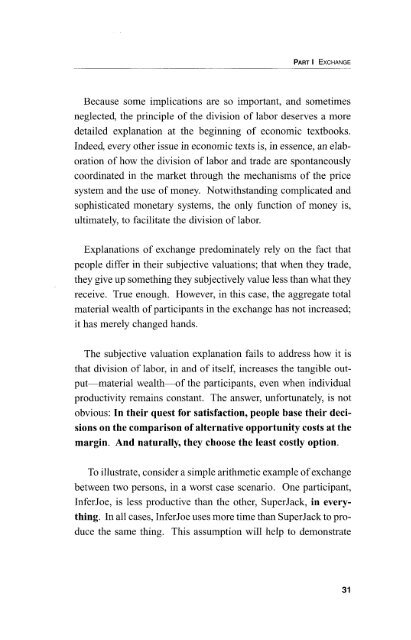Not a Zero-Sum Game - Ludwig von Mises Institute
Not a Zero-Sum Game - Ludwig von Mises Institute
Not a Zero-Sum Game - Ludwig von Mises Institute
You also want an ePaper? Increase the reach of your titles
YUMPU automatically turns print PDFs into web optimized ePapers that Google loves.
Because some implications are so important, and sometimes<br />
neglected, the principle of the division of labor deserves a more<br />
detailed explanation at the beginning of economic textbooks.<br />
Indeed, every other issue in economic texts is, in essence, an elab-<br />
oration of how the division of labor and trade are spontaneously<br />
coordinated in the market through the mechanisms of the price<br />
system and the use of money. <strong>Not</strong>withstanding complicated and<br />
sophisticated monetary systems, the only function of money is,<br />
ultimately, to facilitate the division of labor.<br />
Explanations of exchange predominately rely on the fact that<br />
people differ in their subjective valuations; that when they trade,<br />
they give up something they subjectively value less than what they<br />
receive. True enough. However, in this case, the aggregate total<br />
material wealth of participants in the exchange has not increased;<br />
it has merely changed hands.<br />
The subjective valuation explanation fails to address how it is<br />
that division of labor, in and of itself, increases the tangible out-<br />
put-material wealth-of the participants, even when individual<br />
productivity remains constant. The answer, unfortunately, is not<br />
obvious: In their quest for satisfaction, people base their deci-<br />
sions on the comparison of alternative opportunity costs at the<br />
margin. And naturally, they choose the least costly option.<br />
To illustrate, consider a simple arithmetic example of exchange<br />
between two persons, in a worst case scenario. One participant,<br />
InferJoe, is less productive than the other, SuperJack, in every-<br />
thing. In all cases, InferJoe uses more time than SuperJack to pro-<br />
duce the same thing. This assumption will help to demonstrate

















